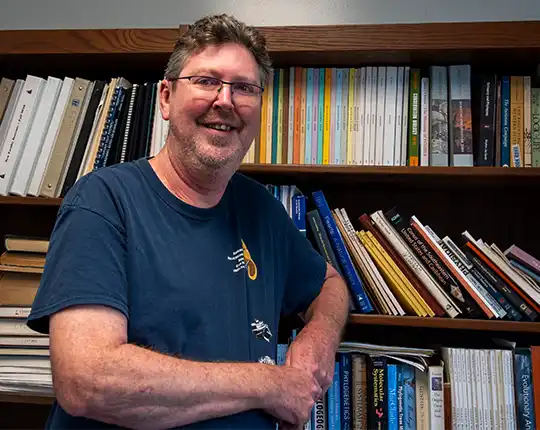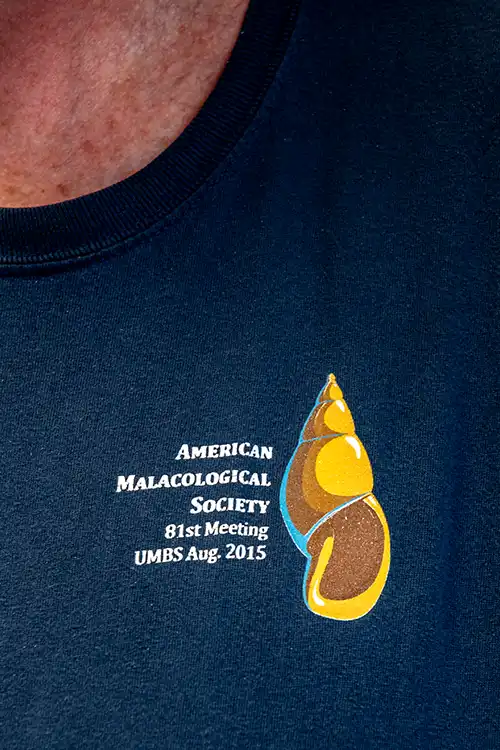Morehead State professor introducing students to a niche subject
 Dr. Charles Lydeard, an MSU professor since 2016, teaches multiple courses including General Zoology lab and Principles of Evolution. However, his passion lies within mollusks, a group of animals which he has advocated for and researched for over 20 years.
Dr. Charles Lydeard, an MSU professor since 2016, teaches multiple courses including General Zoology lab and Principles of Evolution. However, his passion lies within mollusks, a group of animals which he has advocated for and researched for over 20 years.
“There are probably around 100,000 species that are known; it is a very diverse group of animals. It is also one of the most imperiled groups of animals, because since 1500 there have been almost 350 extinctions and those are mostly species that occur on land or in freshwater,” said Lydeard. “When a lot of people think of mollusks, they think of marine ones, but there are those on land like the garden snail, or freshwater clams or snails like we have in Kentucky.”
Lydeard, the Department of Biology & Chemistry chair, has dedicated decades of research to the subject, through which he co-authored a book that was published by John Hopkins University Press and has publications featured in journals such as BioScience and Malacologia.
His passion for mollusks extends beyond his research and into the classroom. From being one of the faculty members that led a study abroad trip to the Galapagos Islands to facilitating classroom conversations, Lydeard’s student-first mentality is apparent in his teaching.
Lydeard said his first introduction to studying mollusks was when he was a student at Auburn University studying for his Ph.D. The university had pushed for the genetic sequencing they were using on fish to be attempted with mollusks, since Alabama has the highest number of freshwater snails and mussels than any other state.
Despite not initially having a background in malacology (the branch of zoology that deals with mollusks), Lydeard transitioned after his doctorate and has studied the group since 1992.
“People pick mollusks for strange reasons. I just slipped into it and that happened with other people who were in my same boat studying fish and went into mollusks,” said Lydeard.
 Lydeard said there have been multiple students that became interested in malacology during his time at MSU because of his passion for the subject.
Lydeard said there have been multiple students that became interested in malacology during his time at MSU because of his passion for the subject.
“You can attract students. I attracted a number of students when I got going. They were drawn to it because I was interested in it and I convinced them to work on it,” said Lydeard. “They graduate and they go off, and they continue working on mollusks. You can make an area grow just by working on it and getting someone excited about it.”
He said that prospective students oftentimes come into MSU unsure of what they want to specialize in, and it allows the opportunity to introduce niche subjects and research topics.
“Most students are like a blank slate when they come in and that is kind of my chance,” said Lydeard.
M.E. Hargan, a senior veterinary science major from Elizabethtown, is one of the students who have taken an interest in Dr. Lydeard’s area of expertise. Hargan had Lydeard’s zoology lab and was a member of the student body who traveled to the Galapagos Islands, where she picked mollusks as her research topic.
“Galapagos helped to get experience in the world,” said Hargan. “We were there for fun but also had a task to do. Going there and then coming back to class, it was just cool with the full circle effect.”
Hargan said that while Lydeard always welcomed questions, he was not afraid to let students make mistakes and learn on their own.
“He is not very handholding. He will let you do what he thinks you can do, and he is always there to answer questions,” said Hargan. “He is always there to help.”
Lydeard said that students like Hargan are one of the ways to continue to get people involved in research topics such as malacology along with continuing to be active in organizations like the American Malacological Bulletin of the American Malacological Society.
“It is good to be a part of the discipline that you represent in some capacity, and a lot of times for people who are not as active in research like myself, one thing you do as a former active researcher is to give back to the society by doing those activities,” said Lydeard.
Lydeard’s passion and expertise are reflected in his recent nomination to serve as the next editor-in-chief of the American Malacological Society's American Malacological Bulletin.
It will be his second stint as editor since he has been at MSU, serving from 2016 to 2021. The American Malacological Bulletin is a premier journal and publishes all aspects of the biology of mollusks, which includes snails, squids and clams. Lydeard will officially take over as editor in January.
Lydeard, who taught at the University of Alabama for 13 years and often saw 500 students in his Introduction to Biology courses, said MSU’s small class sizes and environment are what drew him to Morehead State.
"Here (MSU) the class sizes are much smaller, the professor gets to know the students’ names, they talk to you in the halls when they see you, they teach the lab and the lecture,” said Lydeard. “At large universities, graduate students often teach the labs. I like to have professors teach it because they are more interested in the students’ success.”
You can contact Dr. Lydeard at c.lydeard@moreheadstate.edu or by calling 606-783-2946.
To learn more about MSU’s Department of Biology & Chemistry, contact bioc@moreheadstate.edu or 606-783-2945.
Photos by Emma Hall, a senior media & production major from Ashland.
